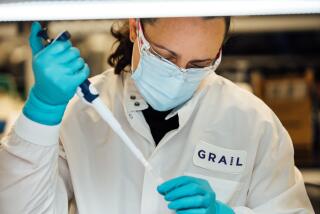Unilab Hopes for Positive Results : Restructuring May Guide Firm Through an Uncertain Future
- Share via
In its brief, five-year history, Unilab Corp., Southern California’s largest medical testing firm, has weathered a costly billing snafu, digested a plateful of acquisitions and seen its share price plummet.
Additionally, for the last two years, the Tarzana-based company, the sixth-largest in the $32-billion medical laboratory business, has been dealing with a federal probe of the industry for possible improper billings for Medicare and Medicaid patients. The investigation--part of a heightened federal effort to ferret out fraud in the health care industry--gained attention last month when several firms, including Unilab, announced that they might receive federal subpoenas.
The news further undermined Unilab’s sagging share price, but the company may be affected more by a federal national health care reform initiative that could make profound changes in the entire industry.
U.S. medical labs, such as those owned by Unilab, perform about 2.6 billion tests each year on blood, urine and tissue. The health care reform plan, expected to be outlined by President Clinton later this month, could result in doctors--under pressure to cut costs--ordering far fewer tests.
The uncertainty over health care reform has caused many investors to shy away from health stocks, including Unilab’s.
“It’s not that I don’t think Unilab is a good company,” said Elizabeth R. Bramwell, president of New York-based Gabelli Growth Fund. “I just wanted to reduce my exposure to health care because I don’t think it’s possible to analyze the industry right now” given Clinton’s pending reform plan.
Richard Jabbour, an analyst at Edward D. Jones & Co. in Maryland Heights, Mo., says he is bullish on the restructuring plan Unilab announced in January. The plan includes selling Unilab’s non-California labs to the company’s biggest shareholder, Corning Inc. In exchange, Corning will assume $70 million of Unilab’s $93-million debt and reduce its ownership in Unilab to about 12% from 43%.
Unilab was formed in 1988 through a joint venture with Corning’s Metpath Inc. unit. It began as four small labs earning $65 million in revenue, and has grown rapidly since.
In announcing the restructuring, Unilab Chairman and Chief Executive Andrew Baker said its primary goal is to enable the company “to focus our domestic efforts around our existing California facilities in Tarzana, San Jose and Sacramento,” where Unilab dominates the medical testing market.
But the agreement with Corning will also significantly improve Unilab’s balance sheet and give the company a foothold in Europe.
In the deal, Corning will transfer its $20-million British clinical laboratory company to Unilab. Unilab will also get a 70% ownership interest in Unilabs SA, a Swiss clinical laboratory company (not currently related to Unilab Corp.) with annual sales of about $45 million.
The restructuring is expected to cut Unilab’s revenue almost in half but could improve profitability. Jabbour, who forecasts earnings of about $12.6 million on revenue of $230 million for all of 1993, said he also expects the company to earn about $11 million on revenue of $145 million in 1994 after the restructuring.
On revenue of $214 million in 1992, Unilab lost $98 million, including $78 million in charges against earnings from acquisitions and a billing foul-up that cost the company $12 million.
The company had problems installing a computerized billing system at its Northern California labs. Instead of streamlining things, the software caused the company to send out loads of incorrect bills to its physician-clients.
So many doctors were upset by patients calling to complain that “we decided to write off the $12 million instead of trying to go back and re-create all the bills,” said James Lawrence, president of Unilab’s Met-West California unit, also in Tarzana.
The snafu also caused Unilab to miss deadlines for submitting many of those bills for federal reimbursement. “Medicare probably owes us money,” Lawrence joked.
More to Read
Inside the business of entertainment
The Wide Shot brings you news, analysis and insights on everything from streaming wars to production — and what it all means for the future.
You may occasionally receive promotional content from the Los Angeles Times.










